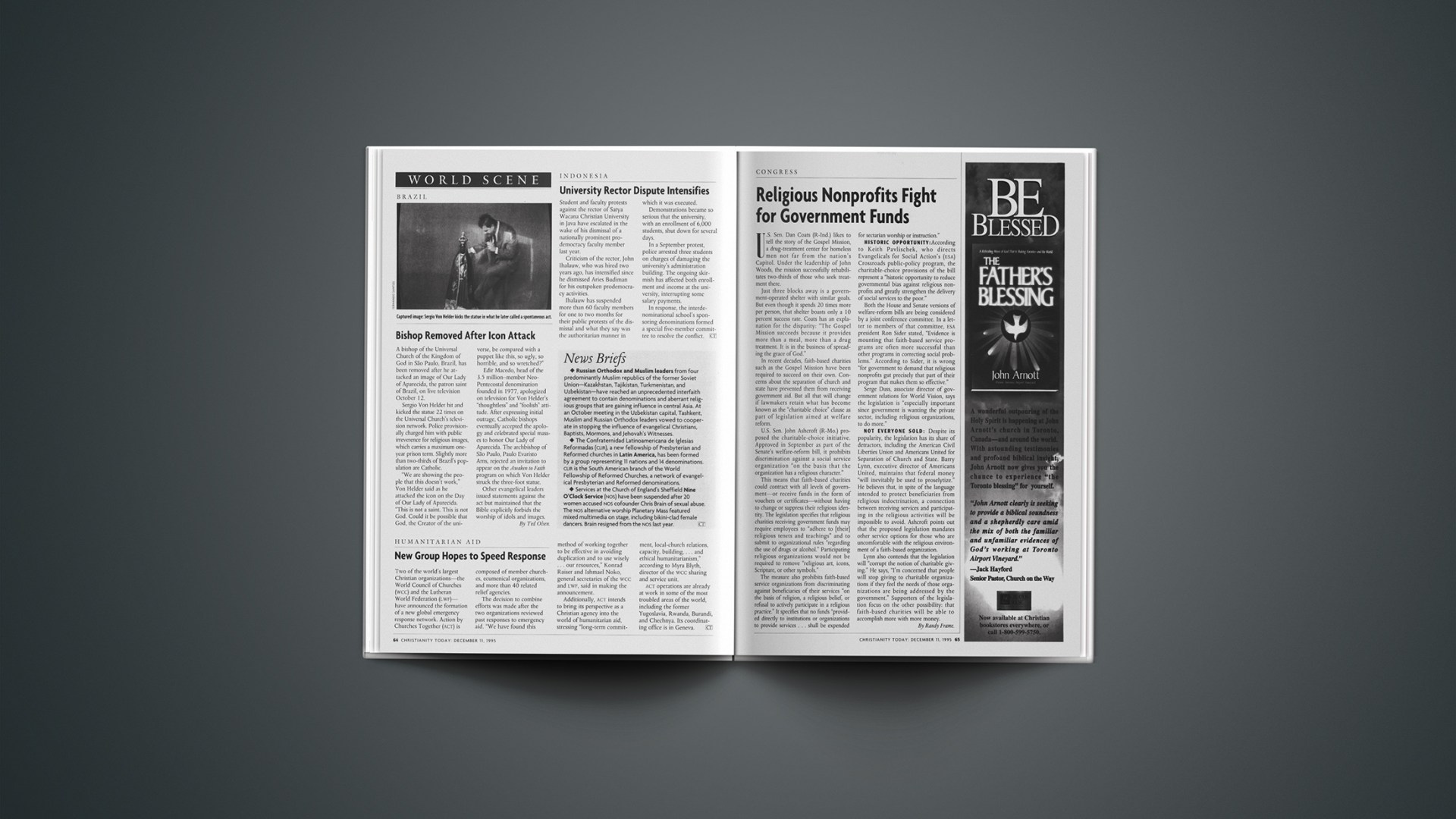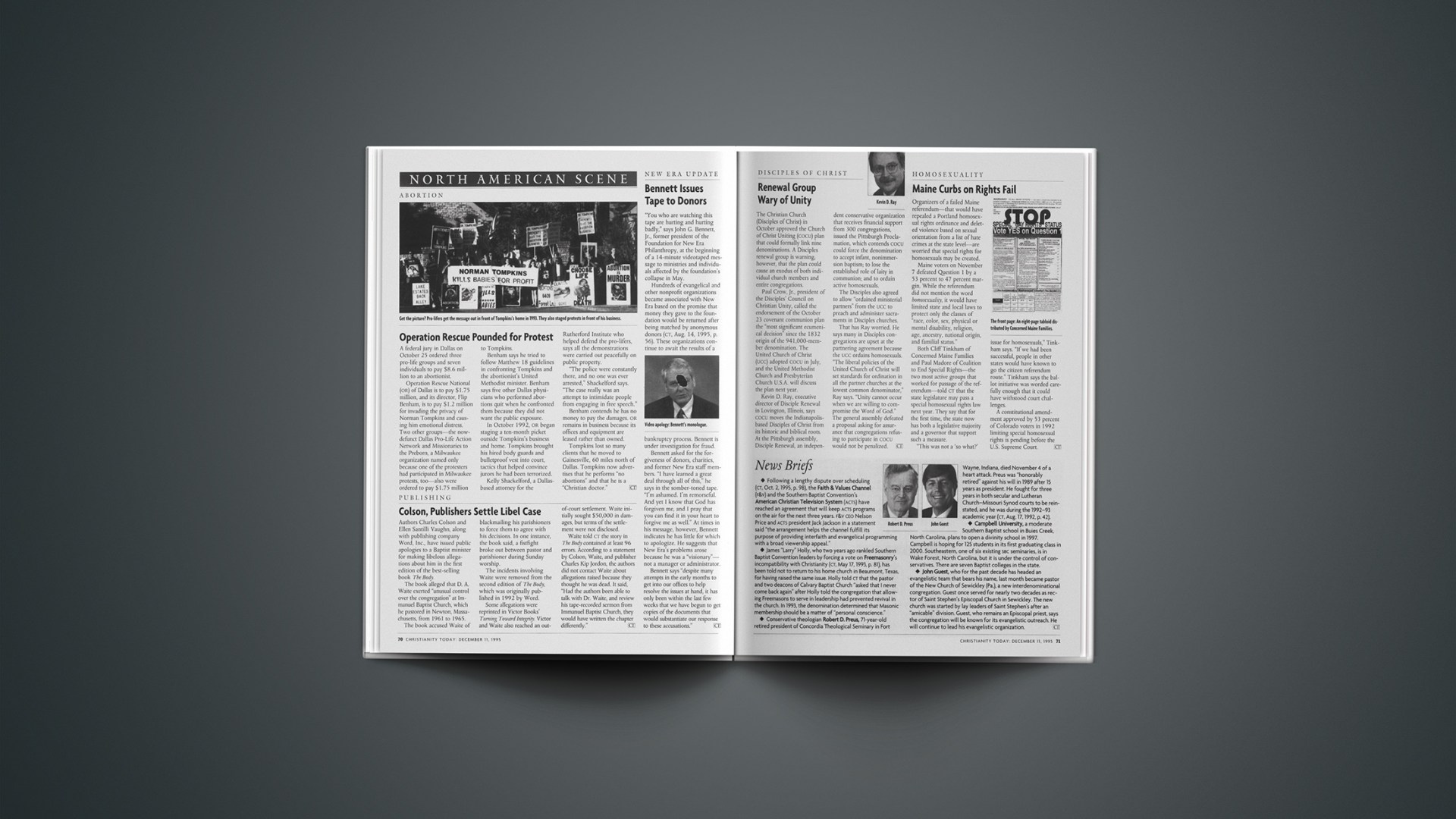CHURCH
In Hot Springs, Arkansas, is the Morris Antique Mall. Nothing on the inside distinguishes this antique store from dozens like it in Hot Springs. There’s a musty smell and dusty relics from the past.
But if you look closely at the outside of the Morris Antique Mall, you’ll see something that makes it distinct: before it was an antique store, it was a church building.
A focus on the future prevents a church from becoming a resting place for rusty relics.
—Michael A. HowesComanche, Texas
CONFLICT
The Fort Worth Star-Telegram reported that firefighters in Genoa, Texas, were accused of deliberately setting more than forty destructive fires. When caught, they stated, “We had nothing to do. We just wanted to get the red lights flashing and the bells clanging.”
The job of firefighters is to put out fires, not start them. The job of Christians is to help resolve conflict (Matt. 5:9), not start more of it.
—Gerald CorneliusAzle, Texas
CONTENTMENT
The Hope Health Letter (10/95) included this story:
Once upon a time, there was a man who lived with his wife, two small children, and his elderly parents in a tiny hut. He tried to be patient and gracious, but the noise and crowded conditions wore him down.
In desperation, he consulted the village wise man. “Do you have a rooster?” asked the wise man.
“Yes,” he replied.
“Keep the rooster in the hut with your family, and come see me again next week.”
The next week, the man returned and told the wise elder that living conditions were worse than ever, with the rooster crowing and making a mess of the hut. “Do you have a cow?” asked the wise elder. The man nodded fearfully. “Take your cow into the hut as well, and come see me in a week.”
Over the next several weeks, the man—on the advice of the wise elder—made room for a goat, two dogs, and his brother’s children.
Finally, he could take no more, and in a fit of anger, kicked out all the animals and guests, leaving only his wife, his children, and his parents. The home suddenly became spacious and quiet, and everyone lived happily ever after.
EVANGELISM
The Oakland, California, police force recently unveiled its first “lowrider” police car. The vehicle has the standard logo, lights, and siren, but also includes chrome wheels, hydraulic lifts, and a 500-watt sound system. The car was put on the force to help officers build better relationships with inner-city kids. Paul applied the same principle to evangelism in 1 Corinthians 9:22-23.
—Chip JohnstonGunnison, Colorado
FREEDOM
Freedom does not mean the absence of constraints or moral absolutes. Suppose a skydiver at 10,000 feet announces to the rest of the group, “I’m not using a parachute this time. I want freedom!” The fact is that a skydiver is constrained by a greater law—the law of gravity. But when the skydiver chooses the “constraint” of the parachute, she is free to enjoy the exhilaration.
God’s moral laws act the same way: they restrain, but they are absolutely necessary to enjoy the exhilaration of real freedom.
—Colin CampbellEnglewood, Colorado
GUILT
In The New Yorker, (5/15/95) Sara Mosle recounts that on March 18, 1937, a spark ignited a cloud of natural gas that had accumulated in the basement of the London, Texas, school. The blast killed 293 people, most of them children.
The explosion happened because the local school board wanted to cut heating costs. Natural gas, the by-product of petroleum extraction, was siphoned from a neighboring oil company’s pipeline to fuel the building’s furnace free of charge.
London never recovered from the blast that turned the phrase “boom town” into a bitter joke. The one positive effect of this disastrous event was government regulation requiring companies to add an odorant to natural gas. The distinctive aroma is now so familiar that we often forget natural gas is naturally odorless.
There is a tendency these days to classify all feelings of guilt as hazardous to our self-esteem. In reality, guilt can be valuable, an “odorant” that warns us of danger.
LUST
The Illinois Department of Natural Resources reports that more than 17,000 deer die each year after being struck by motorists on state highways. According to Paul Shelton, state wildlife director, the peak season for road kills is in late fall.
Why? The bucks are in rut in November. “They’re concentrating almost exclusively on reproductive activities,” he said, “and are a lot less wary than they normally would be.”
Deer aren’t the only ones destroyed by preoccupation with sex.
—Greg AsimakoupoulosNaperville, Illinois
MARRIAGE
The space shuttle Discovery was grounded recently—not by technical difficulties or lack of government funding, but by woodpeckers. Yellow-shafted flicker woodpeckers found the insulating foam on the shuttle’s external fuel tank irresistible material for pecking.
The foam is critical to the shuttle’s performance. Without it, ice forms on the tank when it’s filled with the super-cold fuel, ice that can break free during liftoff and damage the giant spacecraft. The shuttle was grounded until the damage was repaired.
Marriages are frequently damaged not by big things—infidelity or abuse or abandonment—but by the little things. Criticism, lack of respect, and taking each other for granted peck away at the relationship and keep us from reaching the heights.
PERSEVERANCE
In May, 1982, Leonid Brezhnev was president of a country that no longer exists—the Soviet Union. In Baltimore, a lanky shortstop named Cal Ripken played the first game of what became known as “the streak.”
The 6′ 4″ fielder was considered too tall for the position. Yet he just kept plugging away. Last season, 2,131 games later, he set the all-time record for consecutive games played by a major-leaguer.
Greatness comes not just from ability, but also from consistency.
—Sherman L. BurfordFairmont, West Virginia
REDEMPTION
A gem dealer was strolling the aisles at the Tucson Gem and Mineral Show when he noticed a blue-violet stone the size and shape of a potato. He looked it over, then, as calmly as possible, asked the vendor, “You want $15 for this?” The seller, realizing the rock wasn’t as pretty as others in the bin, lowered the price to $10.
The stone has since been certified as a 1,905-carat natural star sapphire, about 800 carats larger than the largest stone of its kind. It was appraised at $2.28 million.
It took a lover of stones to recognize the sapphire’s worth. It took the Lover of Souls to recognize the true value of ordinary-looking people like us.
—Wanda VassalloDallas, Texas
RESPECT
In his book with Ken Blanchard, Everyone’s a Coach, Don Shula tells of losing his temper near an open microphone during a televised game with the Los Angeles Rams. Millions of viewers were surprised and shocked by Shula’s explicit profanity. Letters soon arrived from all over the country, voicing the disappointment of many who had respected the coach for his integrity.
Shula could have given excuses, but he didn’t. Everyone who included a return address received a personal apology. He closed each letter by stating, “I value your respect and will do my best to earn it again.”
There are two ways to gain respect. One is to act nobly. The other is, when you fail to do so, to make no excuses.
***********************
What are the most effective illustrations you’ve come across? For items used, Leadership will pay $25. If the material has been published, please indicate the source. Send contributions to: To Illustrate … , Leadership, 465 Gundersen Drive, Carol Stream, IL 60188.
1996 Christianity Today/LEADERSHIP Journal




